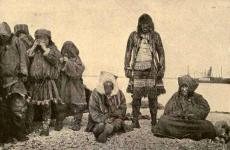Mongolian police. From what means do Mongolian police officers receive bonuses from the Police Headquarters? Mongolian special forces
Mongolian SWAT, photo fototelegraf.ru
A letter came to the ARD with a request to write about the Mongolian special forces. In general, there are jokes about the Mongolian special forces in the Russian-language Network and are accompanied by pictures in the style of riders on horseback. In fact, the fighters of the Mongolian special forces are among the most trained in the world. And a special SWAT unit is considered the pride of the power structures of the steppe country.
Mongolian special forces are:
- 084th Separate Special Purpose Battalion (TTB)
- 150th Separate Special Purpose Battalion
- 330th Separate Special Purpose Battalion

The emblem of the Mongolian police is based on the image of the totem of Genghis Khan on the flag of his troops ... and on the SWAT chevrons.
A bit of history. In Mongolia, in the 19th century and the beginning of the 20th, "Arvan tavny tsagdaa" - "Police units 15" worked. And in 1921, for the first time in the history of Mongolia, a special company - "policemen" was formed from the Mongolian army. Thus began the history of the Mongolian police.
On May 7, 1990, a special police unit was created by decree of the Council of Ministers of the Mongolian People's Republic (the name of Mongolia until 1990).



Demonstrative "performances" of the Mongolian special forces in Afghanistan in 2012. Mongolian Expeditionary Force in Kabul. Photo ir-ingr.livejournal.com

Mongolian Expeditionary Force in Kabul. Photo ir-ingr.livejournal.com
Today, the Mongolian police special forces are a professional unit designed to counter terrorists and especially dangerous criminals. Since 2003, the Mongolian special forces have been successfully working together with the Intelligence Directorate of Mongolia and the Armed Forces of Mongolia.


Since 2004, they have been performing missions jointly with the armed forces of Mongolia and under a UN mandate in the "hot spots" of the world - in Iraq, Afghanistan, Kosovo, Sierra Leone and South Sudan.
And yet, a little national flavor will not hurt even the special forces:



Separately, it should be noted the unit of the Mongolian SWAT - special weapons and tactics.
SWAT(originally S special W eapons A ssault T eam - assault group with special. weapons; currently S special W eapons A nd T actics - special weapons and tactics) - units in law enforcement that use military-style light weapons and special tactics in high-risk operations that require abilities and skills that are beyond the capabilities of ordinary police officers.

SWAT tasks
- Hostage rescue;
- providing a security perimeter against snipers during government visits;
- providing superior firepower in some situations, including against barricaded suspects;
- rescue of policemen and civilians who came under fire;
- counterterrorism operations in US cities;
- resolving situations characterized by high risk with a minimum of death, injury and damage to property;
- resolving situations with barricaded individuals (for this purpose, the Hostage Barricade Team subdivision was specially created);
- stabilization of situations characterized by a high risk of suicide;
- providing support during raids against the drug mafia, arrests on a court order, searches of suspects;
- providing support for special events;
- stabilization of dangerous situations when facing criminals (such as racists, serial killers, gangsters)
- fighting riots.

Girls in the army special forces of Mongolia also serve under a UN mandate in “hot spots” ...

Mongolian police are so harsh...
SWAT police officers are recruited from volunteers from their own law enforcement organizations. Depending on department policy, applicants must serve a minimum term in the department's ranks before being considered eligible for special departments such as SWAT. This tenure requirement is based on the fact that SWAT police officers are still law enforcement officers and must be thoroughly familiar with departmental policies and police procedures.
In this article you can find out the correct answer to the question of the final round in today's game "Field of Miracles" for January 12, 2018. The questions in the game concerned the police of England, St. Petersburg, and in the final they also talked about the police of Mongolia. This is how the question of the final round sounds in the original.
In Mongolia, an employee of a police department can sometimes be paid some additional amount from extrabudgetary funds. In order to have these bonuses, the General Police Department of Mongolia and the police units subordinate to it have their own ... what? (5 letters)
What does the Mongolian police have to support their employees?
Mongolia is a state in East Asia. It borders with Russia in the north and with China in the east, south and west. One of the largest landlocked states in terms of area. Mongolia is a country of livestock breeders. This is evident even in the activities of police units.
To provide support to their employees, the General Directorate of Police of Mongolia and its subordinate police units have their own herds of cows, herds of horses, flocks of sheep, industries that are served by civilian hired workers. The income from this activity goes to the budget of the respective police unit.
Thus, it becomes clear to us that the correct answer to the question of the final round is: a herd (5 letters).
In 1921, Mongolia found sovereignty and established diplomatic relations with Soviet Russia. Over these 95 years, our countries have traditionally richest good neighborly experience of friendship and cooperation.
After the collapse of the Soviet Union, in order to create a solid base and further develop cooperation between our two countries in the field of law enforcement, Agreements and Memoranda on cooperation between ministries and bodies were signed.
Thanks to this, cooperation between our states in the field of law enforcement agencies began to quickly improve and expand in all respects in modern conditions.
Mutual visits
In Mongolia:
In 2001 - Deputy Minister of Internal Affairs of the Russian Federation, head of the Investigative Committee, Lieutenant General V.V. Mozyakov
In 2002 - Minister of Justice of the Russian Federation Yu.A. Chaika,
Minister of Internal Affairs of the Russian Federation, Colonel-General B.B. Gryzlov
First Deputy Minister of Internal Affairs of the Russian Federation, Lieutenant-General R.G. Nurgaliev
In 2003, the Chairman of the Constitutional Court V.D. Zorkin
In 2006, the Chairman of the Constitutional Court V.D. Zorkin
Director of the Federal Drug Control Service of the Russian Federation, Colonel-General O.N. Kharichkin
In Russia:
In 2000, the head of the State Center for Civil Registration andinformation A.Enkhzhav
Deputy Chief of the General Directorate of Police of Mongolia D.Sandag-ochir
In 2001, Minister of Justice and Internal Affairs of Mongolia Ts.Nyamdorj
Chief of the Main Police Department of Mongolia, Major General Ch.Amarbold
In 2003, Chairman of the Constitutional Court of Mongolia N. Zhantsan
In 2004, Deputy Head of the General Police Department of Mongolia B.Boldbaatar
In 2006, the Chairman of the Constitutional Court of Mongolia J. Byambadorzh
In 2007, Deputy Head of the General Police Department of Mongolia A.Dulaanzhargal
In 2011, the Prosecutor General of Mongolia D. Dorligzhav
In 2014, Chairman of the Constitutional Court of Mongolia Zh.Amarsanaa
Head of the Main Department of Takhar (Bailiff) of Mongolia Ts.Azbayar
In 2015, Head of the Main Department for the Execution of Court DecisionsMongolia B. Bilegt
Director of the National Forensic Institute of Mongolia H. Ulziybayar
Law enforcement cooperation
The law enforcement agencies of our two countries are successfully developing cooperation in all areas of relations through the creation of an Agreement and a Memorandum of Cooperation. Within the framework of cooperation, the heads of border law enforcement agencies meet in one side or another every two or three years and discuss problems related to drug organized crime, livestock theft, human trafficking and other such important issues at that time. Both sides attach great importance to this meeting. and the last one was hosted by Russia in September 2014. The next meeting is scheduled for September 2016 in Mongolia.
Training of law enforcement officers of our country is carried out in various educational institutions in Russia, including well-known academies of universities and institutes. Today, 105 employees of our bodies study in higher educational institutions in Russia, and every year 20-25 people study for a short period of up to 1 month at various institutes for advanced training of Russian law enforcement agencies.
Planned visits in 2016
In the second half of the year, the visit of the head of the Main Police Department of Mongolia R. Chingis is planned at the invitation of the Minister of Internal Affairs of the Russian Federation V.V. Kolokoltsev and sign a new Cooperation Agreement
/ September-October 2016 /
Visit of the head of the Main Department of Takhar Mongolia (bailiff) Ts. YII international conference in Ufa Bashkorston.
/ June 2016 /
Working visit of the Director of the National Institute of Forensic Examinations of Mongolia H. Ulziybayar to the Russian Center for Forensic Examinations under the Ministry of Justice of Russia and participation in YI legal forum of St. Petersburg.
/ May 2016 /
Visit of the President of the University of Law Enforcement Service S. Baatarzhav to the Academy of Management of the Ministry of Internal Affairs of Russia and the Moscow University of the Ministry of Internal Affairs of Russia to sign a Memorandum of Cooperation between the above-mentioned educational institutions.
List of the Agreement and Memorandum of Cooperation between the law enforcement agencies of our countries
— Memorandum of Cooperation between the Ministries of Justice of Mongolia and Russia
– Agreement on cooperation between the General Directorate of the Police of Mongolia and the Ministry of Internal Affairs of Russia
— Memorandum of cooperation between the Main Department for the Execution of Judgments of Mongolia and the Federal Penitentiary Service of Russia
— Memorandum of Cooperation between the National Institute of Forensic Expertise and the RCSE under the Ministry of Justice of Russia
— Memorandum of Cooperation between the National Institute of Forensic Expertise and the Russian Center for Medical Expertise (RCME) of the Ministry of Health of Russia
— Memorandum of Cooperation between the General Directorate of Civil Migration of Mongolia and the Federal Migration Service of Russia(FMS)
MINISTRY OF COMMUNICATIONS AND MASS COMMUNICATIONS OF THE RUSSIAN FEDERATION
(MINISTRY OF COMMUNICATIONS OF RUSSIA)
ORDER
20.11.2013 №360
On amendments to the Russian system and numbering plan, approved by order of the Ministry of Information Technologies and Communications of the Russian Federation dated November 17, 2006 No. 1422
In accordance with Part 3 of Article 26 of the Federal Law of July 7, 2003 No. 126-FZ “On Communications” (Collected Legislation of the Russian Federation, 2003, No. 28, Art. 2895; No. 52, Art. 5038; 2004, No. 35, 3607; No. 45, article 4377; 2005, No. 19, article 1752; 2006, No. 6, article 636; No. 10, article 1069; No. 31, article 3431, article 3452; 2007, No. 1, item 8; No. 7, item 835; 2008, No. 18, item 1941; 2009, No. 29, item 3625; 2010, No. 7, item 705; No. 15, item 1737; No. 27, 3408; No. 31, article 4190; 2011, No. 7, article 901; No. 9, article 1205; No. 25, article 3535; No. 27, article 3873, article 3880; No. 29, article 4284, item 4291; No. 30, item 4590; No. 45, item 6333; No. 49, item 7061; No. 50, item 7351, item 7366; 2012, No. 31, item 4322, item 4328 ; 2013, No. 19, article 2326; No. 27, article 3450), as well as subparagraph 5.2.10 of the Regulations on the Ministry of Telecom and Mass Communications of the Russian Federation, approved by Decree of the Government of the Russian Federation of June 2, 2008 No. 418 (Collection of Legislation Russian Federation, 2008, No. 23, article 2708; No. 42, article 4825; No. 46, article 5337; 2009, No. 3, article 378; No. 6, article 738; No. 33, article 408 eight; 2010, no. 13, art. 1502; No. 26, Art. 3350; No. 30, art. 4099; No. 31, art. 4251; 2011, no. 2, art. 338; No. 3, Art. 542; No. 6, art. 888; No. 14, Art. 1935; No. 21, art. 2965; No. 44, Art. 6272; No. 49, Art. 7283; 2012, no. 20, art. 2540; No. 37, art. 5001; No. 39, Art. 5270; No. 46, Art. 6347; 2013, No. 13, item 1568; No. 33, art. 4386),
I ORDER:
1. Introduce into the Russian system and the numbering plan, approved by order of the Ministry of Information Technologies and Communications of the Russian Federation No. 142 dated November 17, 2006 "On approval and implementation of the Russian system and numbering plan" (registered with the Ministry of Justice of the Russian Federation on December 8, 2006 , registration No. 8572) as amended by orders of the Ministry of Telecom and Mass Communications of the Russian Federation dated December 29, 2008 No. 118 “On Amendments to the Order of the Ministry of Information Technologies and Communications of the Russian Federation dated November 17, 2006 No. 142” (registered with the Ministry of Justice of the Russian Federation February 2, 2009, registration No. 13237), dated July 15, 2011 No. 187 "On Amendments to the Order of the Ministry of Information Technologies and Communications of the Russian Federation dated November 17, 2006 No. 142" (registered with the Ministry of Justice of the Russian Federation on August 17, 2011, registration No. 21646) and dated June 15, 2012 No. 158 “On amendments to the Russian system and numbering plan tions approved by Order of the Ministry of Information Technologies and Communications of the Russian Federation No. 142 dated November 17, 2006 (registered with the Ministry of Justice of the Russian Federation on July 6, 2012, registration No. 24829), the following changes:
a) Paragraph 32 shall be supplemented with the words “, as well as the numbers of the relevant emergency operational services: “101”, “102”, “103”, “104.”;
b) clause 32 1 shall be stated as follows:
“32. 1 For access to subscribers and users of mobile and fixed telephone services:
to the telephone line "Child in danger" single numbers "121", "123" are used;
to the unified citizen support service for consultations when receiving state and municipal services in electronic form, a single number “115” is used. ”;
c) Paragraph 46 shall be supplemented with the following paragraph:
"Number format for access to the relevant emergency services: "101", "102", "103", "104.";
d) in paragraph 1 of Table No. 3 to the Russian Numbering Plan, in the column "Value of the DEF code", the numbers "970-979" shall be replaced by the numbers "972-979";
e) in paragraph 12 of Table No. 4 to the Russian Numbering Plan, the column "Name of the telecommunication service" shall be stated as follows: "Access to telematic communication services";
f) in paragraph 13 of Table No. 4 to the Russian Numbering Plan, the column "Name of the telecommunication service" shall be stated as follows: "Access to communication services for data transmission";
g) in Table No. 7 to the Russian Numbering Plan, paragraphs 1 and 2 shall be stated as follows:
| 1. | 100-109 | Range for 3-digit federal service numbers |
| 100 | Time Service | |
| 101 | Fire and Emergency Response Service | |
| 102 | Police | |
| 103 | Ambulance service | |
| 104 | Gas network emergency service | |
| 105-109 | Reserve | |
| 2. | 110-119 | Numbers of services introduced in the Russian Federation in order to harmonize with European legislation in the field of communications |
| 110-111 | Reserve | |
| 112 | Single number for calling emergency services | |
| 113 | Reserve | |
| 114 | Reserve | |
| 115 | A unified citizen support service for consultations when receiving state and municipal services in electronic form | |
| 116XX | Blocking of electronic payment cards | |
| 117 | Reserve | |
| 118XX | Access number to the information and reference systems of the local telephone operator | |
| 119 | Reserve |
h) in paragraph 3 of Table No. 7 to the Russian Numbering Plan, in line "122", the column "Assignment of a range of numbers for access and service numbers" shall be stated as follows: "Reserve".
2. Send this order for state registration to the Ministry of Justice of the Russian Federation.
Minister N.A. Nikiforov







